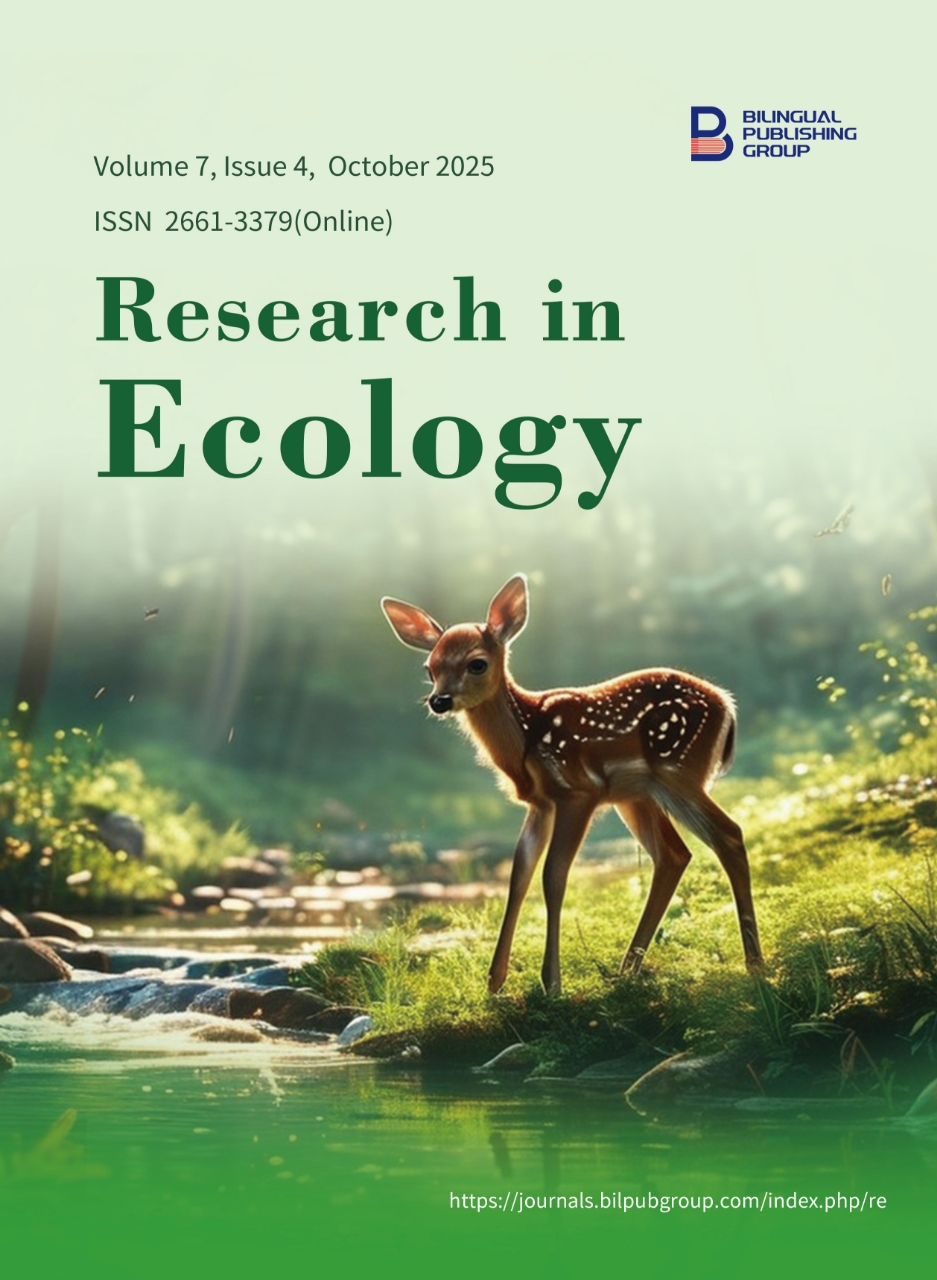
Vegetation Stratum Condition on Bird Diversity in Gunungkelir, Yogyakarta, Indonesia
DOI:
https://doi.org/10.30564/re.v7i4.9724Abstract
Indonesia is an archipelago located in a tropical climate zone that is home to 17% of the world's creatures, but human disturbances still threaten the existence of bird species in Indonesia. This encourages bird conservation efforts both through conservation areas and community forests. This study aims to determine the diversity and interaction of birds with the vegetation stratum in the community forest of Gunungkelir Hamlet, Jatimulyo Village, Kulon Progo Regency, Yogyakarta. This research was conducted from February to March 2024, using a combination of line transect, point count, and rapid assessment methods for bird observation. Data were analyzed using diversity index (H'), evenness (E), and relative abundance. Vegetation stratum data used in vegetation analysis through nested plot sampling to obtain the Important Value Index (IVI). The results showed that there were 21 species from 13 bird families; the diversity value obtained on the three lanes was 2.62 on lane 1, 1.84 on lane 2, and 1.79 on lane 3. The Albizia chinensis species had the highest IVI value at the seedling and sapling levels, with (67%) and (76.4%), respectively; then cloves obtained the highest IVI value at the pole and tree levels with (84.5%) and (81.3%). The majority of birds, comprising as many as 15 species, were found in stratum C, followed by stratum D, which had as many as 8 species, stratum E with 3 species, stratum B with 2 species, and no birds were found in stratum A. The most common form of vegetation utilization found was resting. Birds utilized the stratum layer to rest, play, and find food. Understanding bird ecology also means understanding human safety in wisely managing forest ecosystems.
Keywords:
Ecology; Stratification; Community Forest; Biodiversity; Bird; VegetationReferences
[1] Fikriyanti, M., Wulandari, W., Fauzi, I., et al., 2018. Keragaman Jenis Burung Pada Berbagai Komunitas di Pulau Sangiang, Provinsi Banten. Jurnal BiodTectona grandis. 3(2), 157–165. DOI: https://doi.org/10.15575/biodjati.v3i2.2360
[2] Castano-Villa, G.J., Estevez, J.V., Guevara, G., et al., 2019. Differential effects of forestry plantations on bird diversity: A global assessment. Forest Ecology and Management. 440, 202–207.
[3] Nuswantari, D.S., 2015. Pengaruh keanekaragaman vegetasi, jumlah stratum dan kepadatan semak terhadap keanekaragaman jenis burung di hutan pendidikan Wanagama I. Jurnal Riset dan Manajemen Satwa Liar. Available from: https://www.academia.edu/23726567/Jurnal_Riset_dan_Manajemen_Satwa_Liar_2015
[4] Hu, R., Klein, N., Herzog, F., et al., 2025. Vegetation structure of farmland ditches and its role in promoting bird diversity. Agriculture, Ecosystems & Environment. 389, 109711. DOI: https://doi.org/10.1016/j.agee.2025.109711
[5] Eaton, J.A., van Balen, B., Brickle, N.W., et al., 2022. Burung-Burung Pulau Paparan Sunda dan Wallacea di Kepulauan Indonesia, 1st ed. Yuda, P. (trans.). Lynx Edicions: Barcelona, Spain.
[6] Al-Mubarok, 2013. Pengaruh Strata Vertikal Dan Struktur Kuantitatif Vegetasi Terhadap Jumlah Individu Burung di Hutan Pendidikan Wanagama I. Wildlife Ecology and Management. 1(1), 1–8.
[7] Sutaryo, D., 2009. Penghitungan Biomassa: Sebuah pengantar untuk studi karbon dan perdagangan karbon (13th ed.). Wetlands International Indonesia Programme: Bogor, Indonesia.
[8] Arsalan, A., Gravitian, E., Irianto, H., 2020. Biomassa di atas tanah dan penghitungan simpanan karbon Hutan Kalibiru Kabupaten Kulon Progo. Jurnal Penelitian Biologi. 6(1), 1–8. DOI: https://doi.org/10.23917/bioeksperimen.v6i1.10426
[9] Mardiatmoko, Rohman, Purwanto, 2014. Ilmu Ukur Kayu dan Inventarisasi Hutan. Badan Penerbit Fakultas Pertanian Universitas Patimura: Ambon, Indonesia.
[10] Paramita, E.C., Kuntjoro, Ambarwati, R., 2015. Keanekaragaman dan kelimpahan jenis burung di Kawasan Mangrove Center Tuban. Jurnal Lentera Bio. 4(3), 161–167.
[11] Saputri, I.A., Iswandaru, D., Wulandari, C., 2022. Studi korelasi keanekaragaman burung dan pohon pada lahan agroforestri blok pemanfaatan KPHL Batutegi. Jurnal Belantara. 5(2), 232–245. DOI: https://doi.org/10.29303/jbl.v5i1.854
[12] Indriyanto, 2018. Metode Analisis Vegetasi dan Komunitas Hewan (2nd ed.). Graha Ilmu: Yogyakarta, Indonesia.
[13] Aulia, N., Irundu, D., Idris, A.I., 2024. Inventarisasi Potensi Tanaman MPTS (Multipurpose Tree Species) dan Pemanfaatannya di Kawasan HKm Buttu Puang Kabupaten Polewali Mandar. Pangale Journal of Forestry and Environment. 4(1), 26–36. DOI: https://doi.org/10.31605/pangale.v4i1.3979
[14] Yuwono, S.B., Hilmanto, R., 2015. Pengelolaan hutan rakyat oleh kelompok pemilik hutan rakyat di desa Bandar Dalam Kecamatan Sidomulyo Kabupaten Lampung Selatan. Jurnal Sylva Lestari. 3(2), 99–112. DOI: https://doi.org/10.23960/jsl2399-112
[15] Paker, Y., Yom-Tov, Y., Alon-Mozes, T., et al., 2014. The effect of plant richness and urban garden structure on bird species richness, diversity and community structure. Landscape and Urban Planning. 122, 186–195.
[16] Porter-Bolland, L., Ellis, E.A., Guariguata, M.R., et al., 2012. Community managed forests and forest protected areas: An assessment of their conservation effectiveness across the tropics. Forest Ecology and Management. 268, 6–17.
[17] Effendi, A.A., Rosanti, N.P., Rahajirin, T.C.D., 2022. Keanekaragaman Burung di Taman Hutan Raya Balas Klumprik Surabaya. Sains dan Matematika. 8(1), 1–8. DOI: https://doi.org/10.26740/sainsmat.v8n1.p1-8
[18] Annisa, Iswandaru, D., Darmawan, A., 2023. Analysis of species diversity and conservation status of bird in coffee-based agroforestry. Jurnal Hutan Tropis. 11(3), 355–366.
[19] Fajri, M.N., Kurnia, I., 2022. Keanekaragaman Jenis Burung di Kecamatan Sukamakmur Kabupaten Bogor Provinsi Jawa Barat. Buletin Poltanesa. 23(2). DOI: https://doi.org/10.51967/tanesa.v23i2.2092
[20] Mackinnon, J., Phillipps, K., van Balen, B., 2010. Burung-burung di Sumatera, Jawa, Bali dan Kalimantan. Rahardjaningtrah, W. (ed.). Puslitbang Biologi - LIPI: Bogor, Indonesia.
[21] Wisnubudi, G., 2009. Penggunaan strata vegetasi oleh burung di kawasan wisata Taman Nasional Gunung Halimun-Salak. Vis Vitalis. 2(2), 41–49.
[22] Arsyan, C.J., Iswandaru, D., Fitriana, Y.R., et al., 2024. Analisis Pemanfaatan Strata Vertikal Vegetasi oleh Spesies Burung pada Agroforestri Berbasis Coffea canephora di Area Hutan Kemasyarakatan KPHL Batutegi: Studi Kasus di Desa Penantian dan Sinar Banten, Kecamatan Ulubelu, Kabupaten Tanggamus. Jurnal Hutan Lestari. 12(2), 268–285.
Downloads
How to Cite
Issue
Article Type
License
Copyright © 2025 Bintang Muhammad Hafizh Dzikri, Ike Nurjuita Nayasilana, Galuh Masyithoh

This is an open access article under the Creative Commons Attribution-NonCommercial 4.0 International (CC BY-NC 4.0) License.




 Bintang Muhammad Hafizh Dzikri
Bintang Muhammad Hafizh Dzikri






